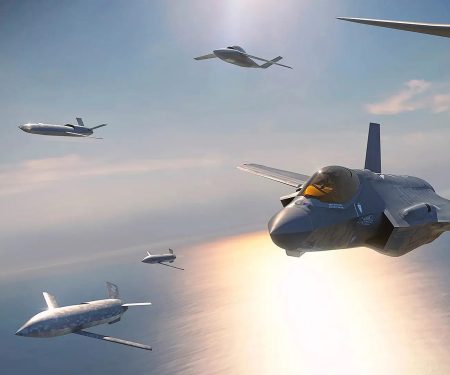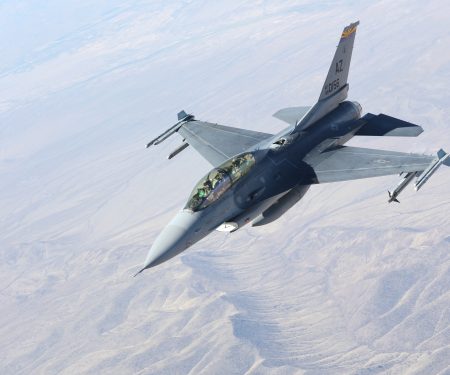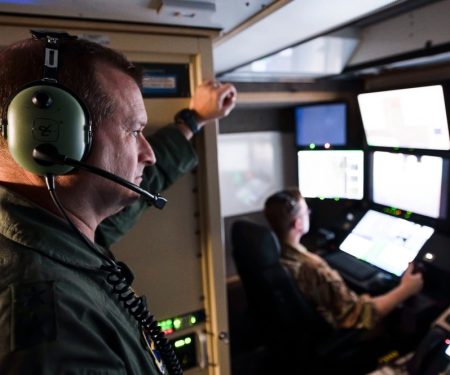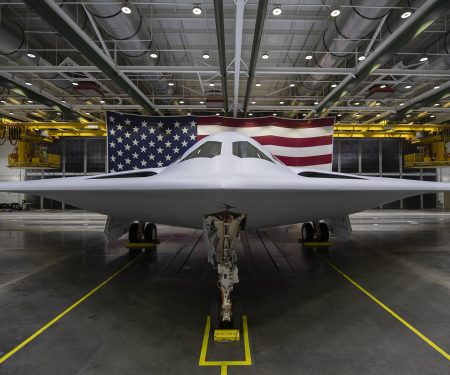Radar Sweep
Talks to Get Underway on Potential End to US-Led Coalition in Iraq
Washington will begin talks with Baghdad to end a U.S.-led international military coalition in the country while determining the best ways to strengthen relations, Defense Secretary Lloyd Austin announced Jan. 25. Working group meetings of the U.S.-Iraq Higher Military Commission will start in the coming days, beginning the process that both countries agreed to during talks in Washington last summer.
China, Russia Disguise Attack Threats Posed by Their Satellites, US Says
China and Russia have launched satellites that are meant to inspect and repair other spacecraft but could be used to attack U.S. assets, according to a new report from the U.S. Space Force. The dual-use nature of some spacecraft, such as the Chinese satellites Shijian 17 and 21, “makes counterspace tests or hostile activity difficult to detect, attribute or mitigate,” the Space Force said in its first public assessment of threats since the service began operation in December 2019.
US Military Eyes Japan's Participation in Autonomous Aircraft Program
The U.S. is ready to work with Japan to develop artificial intelligence-piloted autonomous aircraft for the Air Force, a top official says, as sharing of advanced technology emerges as a priority area of cooperation for the allies. Japan will participate in an American program to develop next-generation drones known as collaborative combat aircraft (CCA) “at some point,” U.S. Secretary of the Air Force Frank Kendall told Nikkei Asia in a phone interview Jan. 23.
Pentagon Plans to Fix ‘Chronically Understaffed’ Medical Facilities
After years of forcing some military beneficiaries to seek medical care in the private sector, the Defense Department wants to attract patients back to military treatment facilities. Citing problems that have led to “chronically understaffed military treatment facilities and dental treatment facilities,” Deputy Secretary of Defense Kathleen Hicks has directed sweeping changes to boost staffing at medical facilities and increase access to care for beneficiaries.
Biden Urges Congress to Approve Turkey F-16 Sale
President Joe Biden on Jan. 24 urged four key lawmakers to greenlight the roughly $20 billion sale of 40 F-16s to Turkey, noting the State Department intends to formally approve the deal as soon as Ankara finalizes Sweden’s NATO accession. The sale of the Block 70 F-16 fighter jets from Lockheed Martin, which also includes 80 modernization kits, had been stalled for years, with the latest issue being Turkey’s nearly two-year-long blockade of Sweden’s NATO bid.
Marine Corps’ Gen. Mahoney Vows to Get V-22s Flying Again amid Pentagon-Wide Grounding
Amid a Pentagon-wide grounding of the V-22 fleet, the second most senior Marine, an aviator himself, vowed the service will get the “revolutionary platform” flying safely again, arguing the fix for “hard clutch engagements” being installed on the planes right now has corrected the key issue at the center of several mishaps.
US Secretly Alerted Iran Ahead of Islamic State Terrorist Attack
The U.S. secretly warned Iran that Islamic State was preparing to carry out the terrorist attack early this month that killed more than 80 Iranians in a pair of coordinated suicide bombings, U.S. officials said. The confidential alert came after the U.S. acquired intelligence that Islamic State’s affiliate in Afghanistan, ISIS-Khorasan, known as ISIS-K, was plotting to attack Iran, they said.
The Pentagon’s IT Agency Is Crafting Its Very Own AI-Chatbot
Battlefield commanders could soon get an assist from an AI-powered chatbot when making sense of sensitive, but unclassified, information. But the prototype must first be tested by the Pentagon’s top IT agency. The Defense Information Systems Agency is developing “Concierge AI” technology that can take data from multiple sources, plug it into a model or database, “and then have a large language model bang against that database and present the user with answers,” Steve Wallace, the agency’s chief technology officer and head of emerging technologies, said.
Humvee Use at Air Force’s Nuclear Missile Bases Changed After 2 Airmen Died in Recent Months
Air Force officials at the nation's nuclear missile bases are reexamining the way they train with Humvees after two Airmen died in the vehicles late last year. The 20th Air Force, the numbered combatant command that oversees intercontinental ballistic missiles at bases and sites in the western U.S., initiated “a deliberate pause coupled with a reassessment of training, certification, and employment” for Airmen using the Humvee, said Col. Brus Vidal, an Air Force Global Strike Command spokesman.
Lockheed Martin, Boeing Win Contracts to Design US Military Narrowband Communications Satellites
The U.S. Space Force has awarded Lockheed Martin and Boeing $66 million contracts each to design a new narrowband communications satellite. The contracts are part of a competition to eventually build two satellites that will expand the Mobile User Objective System (MUOS), a network of satellites used by the U.S. military to transmit voice and data communications. Over the next 15 months, the companies will create prototype satellites showing how they would meet the Space Force’s requirements for the MUOS satellites.
Flying The Block 70 F-16 ‘Ultimate’ Viper According to Its Test Pilot
Originally manufactured by General Dynamics, and now by Lockheed Martin, a healthy order book, differing customers' needs, and new technological insertions mean that F-16 flight test remains extremely active, with current Lockheed Martin test pilot Ryan “Cujo” Blake playing a critical part in the team that helps to keep the Fighting Falcon's talons sharp. Blake flies the latest Block 70 F-16 variant and he was kind enough to talk to us about what it's like flying the ‘ultimate’ Viper.




